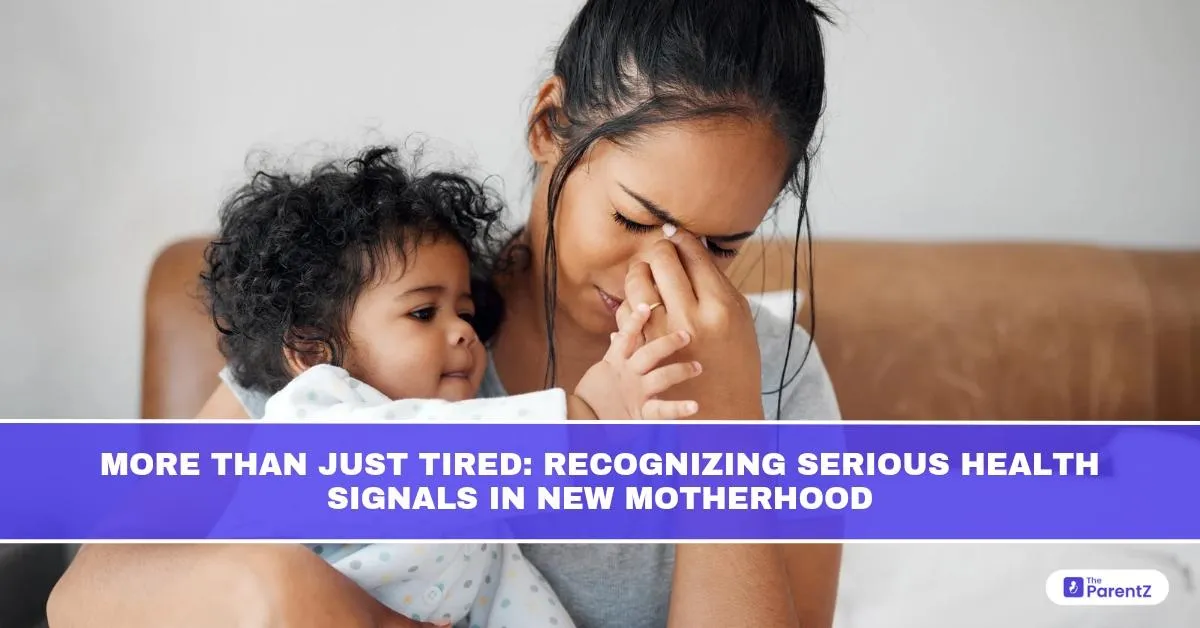When “Just Tired” Might Mean Something More
New motherhood is often wrapped in soft blankets, sleepless nights, and cuddles but behind the scenes, many women battle an overwhelming fatigue. While tiredness is expected after childbirth, not every ache, bleed, or emotional low should be brushed off as “normal.”
Sometimes, what seems like exhaustion or stress could be your body sending out urgent health signals. Understanding which symptoms to watch out for and when to seek help can prevent complications and potentially save lives.
Section 1: Fatigue Is Common But It Shouldn’t Be Debilitating
After childbirth, sleep deprivation, blood loss, breastfeeding, and healing all contribute to fatigue. But when fatigue does not improve with rest, worsens over time, or is paired with other symptoms, it’s a red flag.
Look out for:
- Extreme weakness or dizziness even after light activity
- Breathlessness while walking or climbing stairs
- Palpitations, blurry vision, or tingling sensations
These may point to postpartum anemia, thyroid imbalances, or even cardiac strain, especially in women with a history of high blood pressure or gestational diabetes.
Section 2: Postpartum Infections Are Not Always Obvious
Infections can occur in the uterus, C-section wound, urinary tract, or breasts and they often start subtly.
Warning signs include:
- Fever over 100.4°F (38°C)
- Foul-smelling vaginal discharge
- Red, hot, or painful areas on the belly or breast
- Burning urination or pelvic pain
Don’t wait it out, many women delay seeking help, thinking it’s part of the healing. Untreated infections can turn into sepsis, a life-threatening condition.
Section 3: Pain That Feels “Wrong” Needs Attention
Some pain is expected after childbirth like uterine cramps or mild perineal discomfort. But persistent, worsening, or sudden sharp pain should never be ignored.
Watch for:
- Severe abdominal pain or bloating
- Chest pain or shoulder pain (possible clot or gallbladder issue)
- Pain in one leg with swelling or warmth (deep vein thrombosis)
- Unrelieved perineal or rectal pain
Tip: Use a pain scale to track intensity. If it’s increasing or interfering with movement or sleep, consult a doctor.
Section 4: Bleeding and Clots, Know What’s Normal
Post-birth bleeding (lochia) is natural, but it should gradually lighten in color and flow.
Abnormal signs:
- Soaking through a pad every hour for 2+ hours
- Large blood clots bigger than a ₹5 coin (or 1-inch)
- Bleeding that increases after initially slowing
- Fainting or pale skin along with heavy bleeding
These could indicate retained placenta, uterine atony, or secondary postpartum hemorrhage.
Section 5: Breastfeeding Issues That Signal Trouble
While breastfeeding can come with some discomfort, intense pain, swelling, or fever is not normal.
Take action if you notice:
- Hard, red lumps in the breast (may signal mastitis or a blocked duct)
- Cracked or bleeding nipples
- Baby refusing to feed from one side
- Flu-like symptoms with breast tenderness
Mastitis can worsen into a breast abscess if untreated, requiring drainage and antibiotics.
Section 6: Mood Changes vs. Postpartum Mental Health Disorders
It’s natural to feel overwhelmed but when sadness becomes suffocating or anxiety becomes crippling, it’s time to seek support.
Know the difference:
- Baby blues last up to 2 weeks, with mild mood swings
- Postpartum depression causes persistent sadness, lack of interest, or guilt for weeks or months
- Postpartum anxiety may involve constant worry, panic attacks, or racing thoughts
- Postpartum psychosis (rare) includes delusions, hallucinations, or confusion, and is a medical emergency
Mental health is physical health. Speak to your gynaecologist or a therapist as early treatment is effective and essential.
Section 7: Thyroid Trouble Often Hides in Plain Sight
Postpartum thyroiditis affects 5–10% of new mothers and is often misdiagnosed as depression or tiredness.
Suspect thyroid issues if you experience:
- Sudden weight gain or loss
- Heat or cold intolerance
- Mood swings, hair thinning, or irregular periods
- Brain fog or memory lapses
A simple TSH blood test can identify thyroid imbalances that may be managed with medication.
Section 8: Don’t Ignore the Gut and Pelvic Floor
- Constipation, urine leakage, or pelvic heaviness may seem trivial but could indicate rectal prolapse or pelvic floor dysfunction.
- Chronic discomfort while sitting or using the toilet should be evaluated by a women’s health physiotherapist or gynecologist.
Tip: Postpartum pelvic floor checks are common abroad and should be normalized in India too.
When to Call the Doctor Immediately
Seek medical help immediately if you notice:
- Sudden high fever
- Difficulty breathing or chest tightness
- Seizures or vision changes
- Heavy bleeding with clots
- Suicidal thoughts or extreme confusion
These could be signs of:
- Sepsis
- Pulmonary embolism
- Eclampsia
- Postpartum depression or psychosis
Conclusion: Speak Up, Don’t Suffer Silently
Motherhood comes with a lot of change but pain, fear, and overwhelming fatigue should never be brushed off. Listen to your body. Advocate for your health. And remember, early detection saves lives, yours included.
Whether you delivered normally or via C-section, your postpartum care doesn’t end after six weeks. You deserve medical attention, emotional support, and a healing journey that’s safe and strong.






Be the first one to comment on this story.